
Quotes by Benjamin Constant
1767 – 1830
Benjamin Constant (1767–1830) was born in Switzerland and became one of France’s leading writers, as well as a journalist, philosopher, and politician. His colorful life included a formative stay at the University of Edinburgh; service at the court of Brunswick, Germany; election to the French Tribunate; and initial opposition and subsequent support for Napoleon, even the drafting of a constitution for the Hundred Days.
Bio
Constant wrote many books, essays, and pamphlets. His deepest conviction was that reform is hugely superior to revolution, both morally and politically. Sir Isaiah Berlin called Constant “the most eloquent of all defenders of freedom and privacy” and believed to him we owe the notion of “negative liberty,” that is, what Biancamaria Fontana describes as “the protection of individual experience and choices from external interferences and constraints.” To Constant it was relatively unimportant whether liberty was ultimately grounded in religion or metaphysics—what mattered were the practical guarantees of practical freedom—“autonomy in all those aspects of life that could cause no harm to others or to society as a whole.”
See the Liberty Matters online discussions on “Limited Government, Unlimited Liberalism. Or, How Benjamin Constant was a Kantian After All” and “Meanings of Liberty: Aron, Constant, Berlin”
For more information about Benjamin Constant see the essays listed below:
Constant featured as the October 2021 OLL Birthday. Read it here
Presidents, Kings, Tyrants, & Despots
Benjamin Constant argued that mediocre men, when they acquired power, became “more envious, more obstinate, more immoderate, and more convulsive” than men with talent (1815)
Politics & Liberty
Benjamin Constant distinguished between the Liberty of the Ancients (“the complete subjection of the individual to the authority of the community”) and that of the Moderns (“where individual rights and commerce are respected”) (1816)
Freedom of Speech
Benjamin Constant and the Freedom of the Press (1815)
Politics & Liberty
Benjamin Constant on why the oppressed often prefer their chains to liberty (1815)
War & Peace
Benjamin Constant on the dangers to liberty posed by the military spirit (1815)
Natural Rights
Benjamin Constant on the difference between rights and utility (1815)